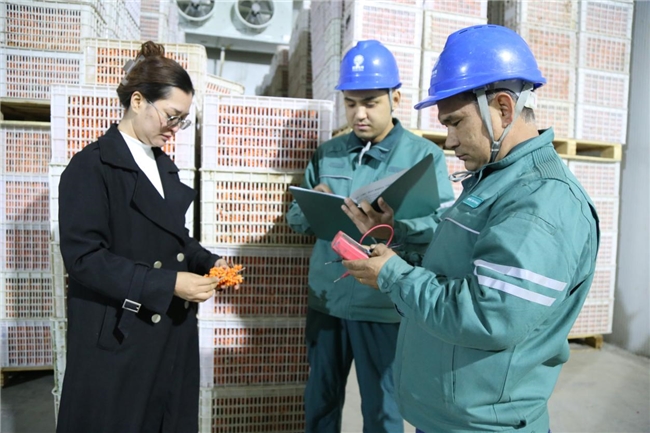On the Gobi desert of Aotubeixi Township in Wushi County, Xinjiang, the once barren land is now dyed a vibrant red by endless seabuckthorn forests. These seabuckthorns are not only "ecological guardians" for windbreak and sand fixation, but also, driven by stable electricity supply, have connected a complete industrial chain spanning planting, processing, R&D, sales, and the integration of cultural tourism. They have injected strong momentum into the rural revitalization of the local area.
"In 2019, we planted seabuckthorn seedlings in the Gobi with great hope. However, there was no electricity back then, making water pumping difficult, and the survival rate of the seedlings was less than 30%," recalled Yang Benming, person in charge of the seabuckthorn planting base. Faced with this challenge, State Grid Aksu Power Supply Company responded promptly and listed ensuring electricity supply for the seabuckthorn industry as a key task. Braving sandstorms and high temperatures, electric power workers erected power lines in the Gobi. In 2019 alone, 247.9 kilometers of 10-kilovolt power lines and 302.89 kilometers of 0.4-kilovolt power lines were newly constructed, and 239 distribution transformers were added or replaced, opening up the "power artery" for the seabuckthorn industry.
"When electricity is connected, hope arrives!" Yang Benming said. The base quickly built water pumping stations, laid out efficient seepage irrigation systems, and promoted scientific planting techniques, significantly increasing the survival rate of seabuckthorns to over 85%.
Stable electricity supply not only safeguards the ecology, but also activates the industrial chain. At present, the seabuckthorn planting area in Wushi County has reached 160,000 mu , attracting 3 deep-processing enterprises to settle here and forming an integrated industrial system covering planting, processing, R&D and sales.
In the aseptic workshop of Yushang Jingji Company, the automated production lines operate in an orderly manner. From cleaning, pressing, extracting to filling... 18 processes are efficiently completed with the guarantee of electricity supply. Fresh seabuckthorn fruits are processed into 32 types of products, including original pulp, fruit oil and skincare products, which are sold to the domestic market and Central Asian regions.

Over the past five years, State Grid Wushi County Power Supply Company has continuously upgraded the power grid, built a grid structure with 220 kV as the backbone and 110 kV dual radiation, and developed a "grid +" service system, providing support for the large-scale and digital development of industries.
In the cold chain storage area, six large-scale cold storage facilities maintain a constant temperature and humidity through a dual-power supply system. "If the main power line fails, the backup power supply can switch over within 0.1 seconds to ensure uninterrupted production," introduced Zhang Bin, a staff member of State Grid Aksu Power Supply Company.
Power stability is crucial to product quality. Li Lei, a technician from Yushang Jingji Technology, stated: "The extraction and filling processes have extremely high requirements for temperature control precision, and voltage fluctuations may affect entire batches of products." In response, the power supply company has launched the "Digital & Intelligent Electricity Bill Manager" service, providing enterprises with customized energy-saving solutions to optimize electricity costs.
From "ecological trees" that prevent wind and fix sand to "prosperity trees" that boost income, the sea-buckthorn industry in Wushi County has achieved a win-win situation for both ecological and economic benefits. Driven by the "power engine", the sea-buckthorn industry is continuously activating the "vitality for rural revitalization", painting a new picture of thriving industries, beautiful villages and prosperous people in the border areas. (Liu Mengyi, Wang Hongxia)
